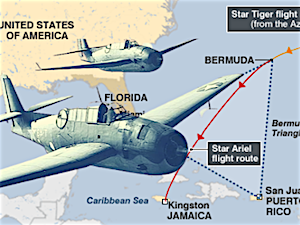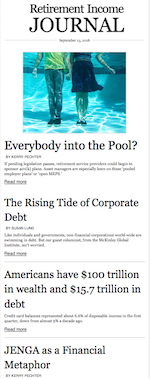
At the Spring National Meeting of the National Association of Insurance Commissioners (NAIC) this week (March 14-15) in Phoenix, two actuaries are scheduled to make presentations related to the role of reinsurance as it pertains to what RIJ calls the Bermuda Triangle strategy.
The meeting will take place both in person and virtually. Here are links to the registration page and materials page.
Patricia Matson, chairperson of the Asset Adequacy and Reinsurance Issues Task Force of the American Academy of Actuaries, will give a presentation titled, “Asset Intensive Reinsurance Ceded Offshore from U.S. Life Insurers (with focus on Bermuda).” Fred Andersen, chief life actuary at the Minnesota Department of Commerce, will speak on “a Proposal to Require Asset Adequacy Analysis for Certain Reinsurance.”
Private ownership of life re/insurers may affect credit ratings, says Fitch
Private ownership could affect an insurance company’s credit rating; a focus on short term gains would be among the biggest risks, Fitch Ratings has warned.
In a commentary, Fitch said the credit impact of private ownership on an insurer hinges on the owner’s strategy, including influence on the insurer’s business plans, investments, capital management and dividends. Fitch issued the commentary in the wake of Zurich Insurance’s January decision to call off the sale of a book of life policies to German consolidator Viridium, majority-owned by a private equity firm.
But the issue has been in the spotlight for longer, with the International Monetary Fund’s flagging of the vulnerabilities of privately owned life insurers in its October 2023 Global Financial Stability Report, citing their exposure to illiquid investments, sometimes controlled by the private equity firms themselves.
The IMF particularly noted the growth of the life re/insurance sector in Bermuda, which now manages $1 trillion of assets or about 4% of the global pension market.
“Some private equity firms may prioritize short-term gains for shareholders over longer-term considerations for policyholders and debt holders,” Fitch said. “This may result in riskier business and investment strategies for the insurers they own, and aggressive extraction of capital, which is credit negative. In addition, financial disclosures tend to be less transparent due to the lack of public reporting requirements.”
Fitch said that in “developed markets,” regulatory oversight significantly limits the risks that are often associated with privately owned insurers. “In most cases, regulatory approval is required for a change of ownership or senior management, and privately owned insurers are subject to the same regulation as publicly owned insurers, including scrutiny of governance and risk management frameworks,” the ratings agency said.
But it added: “Private ownership is not, in itself, automatically credit negative for insurers. We assess each case on its own merits in accordance with our Insurance Rating Criteria. For ownership to potentially influence the insurer’s ratings, the owner has to exercise control, as is usually the case with 100% ownership or if there are very strong operational, governance or financial ties.
“Private ownership may be negative for the ratings if the owner has weaker credit quality than the insurer or is likely to govern in an adverse manner. Conversely, if the owner has stronger credit quality and is likely to be supportive, the ownership may be positive for the ratings.”
In assessing the credit implications of private ownership, we focus, in particular, on the owner’s influence on the insurer’s business plans, investment and capital management strategies, and policies for shareholder dividends and capital returns. For example, rapid growth through aggressive sales could increase reputational and regulatory risks, while underpricing to gain market share could lead to financial losses. A riskier investment strategy in pursuit of higher returns could also be credit negative. Capital management is among the most important considerations, given the prevalence of private equity firms focused on short-term gains for shareholders.”
Fitch said that when the Zurich-Viridium transaction was called off, Viridium cited its ownership structure as a factor in the decision. “Viridium is majority owned by Cinven, a UK private equity firm. Cinven also owned the Italian life insurer Eurovita, whose policies were transferred to a newly established entity owned by several other insurers following a capital shortfall and intervention by the Italian insurance regulator last year.”
AM Best this week downgraded the ratings of Bermuda-based life re/insurer 777 Re for a second time in six months, citing its holdings of illiquid investments, some of which were invested in holdings of its ultimate parent, 777 Partners.
F&G issues its first RILA
F&G Annuities & Life, Inc. (NYSE: FG), a leading provider of insurance solutions serving retail annuity and life customers and institutional clients, has launched its first registered index-linked annuity (RILA), F&G Confidence Builder. The product “addresses retirement challenges from volatility to inflation, seeking to find a balance between managing risk and long-term growth potential,” F&G said in a release.
RILAs are structured products that use the purchase of options, primarily on the movement of equity market indexes or balanced indexes, to deliver returns within certain upper and lower bounds. They are cousins to fixed index annuities, which are also structured products. RILAs differ from FIAs in important ways, however. FIAs do not permit market losses; it is possible to lose money on a RILA over a specific crediting period, but only down to a floor rate or net of a buffer rate.
FIAs yield returns up to a cap or with a certain participation rate; RILA caps and participation rates tend to be higher, since they offer less downside protection. While FIAs are fixed insurance products that can be sold by insurance agents, RILAs are registered securities that are sold only through brokerages.
Since Equitable introduced RILAs in 2010, the category has grown quickly. Total industry RILAs sales are forecasted by LIMRA to be at a record level between $44 to $48 billion in 2023. Allianz, Brighthouse, Equitable, Jackson National, Lincoln Financial Group, and Prudential are among the leading RILA issuers.
F&G’s Confidence Builder offers a proprietary “Hindsight 20/20 strategy.” The strategy simultaneously tracks three Bank of America balanced indexes: BofA MP Balanced Index, BofA MP Growth Index and BofA MP Defensive Index. At the end of each crediting period, Hindsight 20/20 credits applies the “best-of performance” among these three indexes, allowing customers to benefit from the best performing of these indices.
“The BofA MP Indices are inspired by model portfolio strategies and include equity exposure ranging from 40% to 75% to meet different risk tolerance levels as well as varying allocations to four familiar, commonly used assets,” said William Holligan, managing director and head of Structured Equity Derivatives Sales at BofA Securities.
The best-performing index may have negative performance, under-perform the general market, and/or be subject to a buffer, F&G disclosed in its product announcement. The Confidence Builder is available with a downside buffer but not a downside floor. Buffers offer protection from initial losses up to a certain pre-determined threshold, then you’re responsible for any additional losses. Hindsight 20/20 strategy is only available on 6-year segments.
AEL reports record FIA sales, high surrenders of FRAs
American Equity Investment Life Holding Company (NYSE: AEL) reported record full-year annuity sales of $7 billion for 2023, with sales of two fixed indexed annuities with guaranteed income riders, Income Shield and Eagle Select Income Focus, accounting for over 60% of premium deposits.
“Our in-house expertise in tactical asset allocation and asset manager selection positioned us to achieve a 26% allocation to private assets, company president and CEO, Anant Bhalla, said in a release. “We delivered a 23-basis point increase in yield compared to full year 2022 and 92 basis points of yield improvement compared to full year 2021.”
AEL reported a fourth quarter 2023 net loss of $(475.9) million, or $(6.04) per diluted common share compared to $21.7 million, or $0.25 per diluted common share for fourth quarter 2022. Full year 2023 net income was $166.9 million, or $2.06 per diluted common share compared to $1.9 billion, or $20.50 per diluted common for full year 2022.
Bhalla said, “Our agreement to merge with Brookfield Reinsurance was an important marker in our transformation of the American Equity business model, delivering both shareholder value creation from the AEL 2.0 strategy and validation of our capabilities in insurance liability origination asset management.” He added:
“In the latter, we have proven out the ability to both source robust returns on private assets and then restructure these investments to deliver a superior return on equity for the insurance balance sheet. This strategy has created a more than three-fold increase in value for American Equity shareholders based on the average volume-weighted stock price of $17.86 in March 2020 while also returning approximately $1.1 billion to shareholders over that period over the ten quarters from the fourth quarter of 2020 to the first quarter of 2023.”
Effective October 1, 2023, the company completed its second Vermont-domiciled redundant reserve financing facility. Backed by a new relationship with a leading international reinsurer, the new facility reinsured approximately $550 million of in-force statutory reserves for lifetime income benefit guarantees resulting from sales of both American Equity Life’s IncomeShield product and Eagles Life’s Eagle Select Income Focus product freeing up approximately $450 million, pre-tax, of capital at close. In addition, the financing facility allows future new business to automatically benefit from the financing of redundant reserves, thereby enabling the capital-efficient growth of our guaranteed retirement income products going forward.
Fourth quarter 2023 sales were $2.0 billion, substantially all of which were in fixed index annuities. Total enterprise FIA sales decreased 11% from the third quarter of 2023 but were up 153% compared to the fourth quarter of 2022. Despite the sequential quarterly decrease, the level of quarterly FIA sales was still the third highest in the company’s history.
Compared to the third quarter of 2023, FIA sales at American Equity Life in the Independent Marketing Organization (IMO) channel fell 10%, while Eagle Life FIA sales through banks and broker-dealers fell 14%. The decrease in FIA sales relative to the third quarter was driven by lower sales in the accumulation product space.
Bhalla said, “We continued to record strong FIA sales in the fourth quarter of 2023, despite lowering S&P 500 caps on our accumulation products late in the third quarter, in line with our product profitability targets in light of lower interest rates.
“We were particularly pleased that sales of income products, which we believe is the most attractive sector in the FIA marketplace, were up 4% from the third quarter on a total enterprise basis to nearly $1.5 billion.
“Income product sales are not as subject to churn as are accumulation products in a higher interest rate environment and have weighted average life duration characteristics that best match our at scale capabilities in originating and structuring private asset strategies.”
Global Atlantic closes $10bn block reinsurance deal with Manulife
Global Atlantic Financial Group, the insurance subsidiary of KKR, the global investment firm, has closed its expected reinsurance transaction with Manulife Financial Corporation (NYSE: MFC). General account assets under management supporting the transaction at closing are approximately $10 billion.
Under the terms of the transaction, signed and announced in December 2023, Global Atlantic will reinsure “a seasoned and diversified block” of Manulife’s life, annuity, and long-term care (LTC) insurance business originated in the US and Japan. It represents the third block transaction between the two firms and includes Global Atlantic’s first block reinsurance transaction in Japan.
Simultaneously, Global Atlantic retroceded 100% of the LTC insurance risks to a “highly rated third-party global reinsurance partner,” retaining only “the underlying spread-based risks on the subset of the block that involves the LTC business.”
Global Atlantic said it has now completed more than 40 transactions with nearly 30 clients and reinsured more than $140 billion of assets since inception. Global Atlantic was originally formed as the Goldman Sachs Reinsurance Group in 2004 and became a privately-held independent company in 2013. KKR acquired a majority state in the firm in 2021 and became 100% owner in 2024.
© 2024 RIJ Publishing LLC. All rights reserved.


